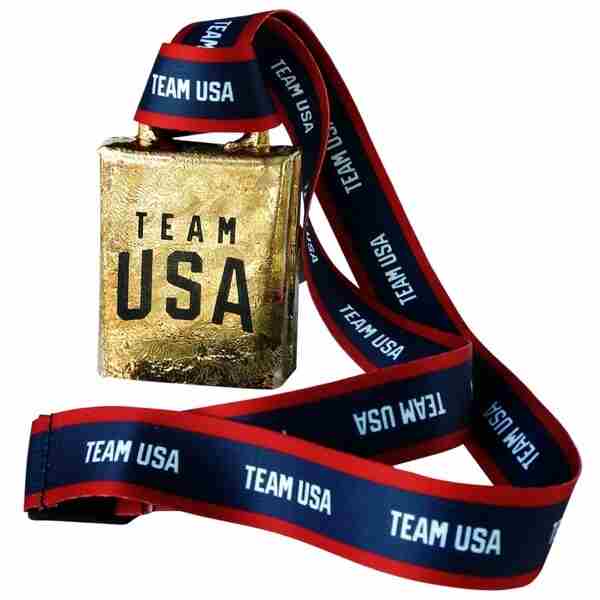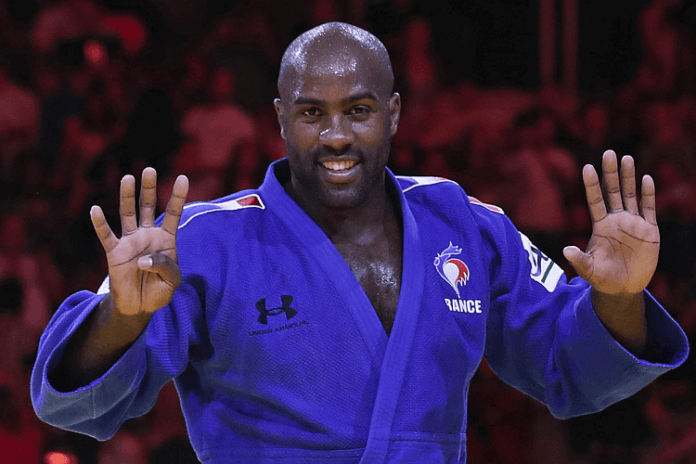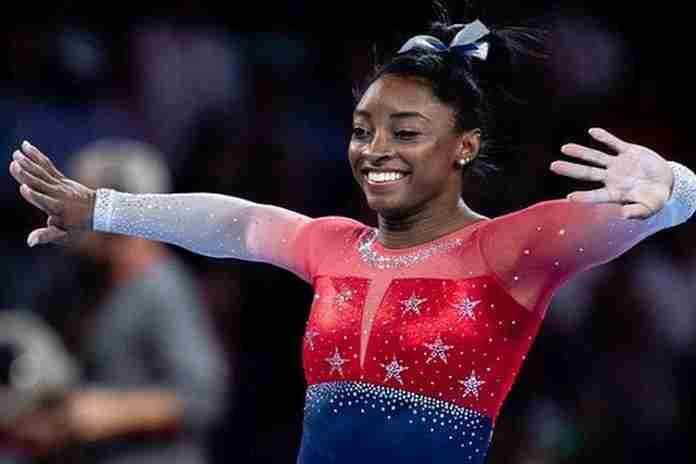≡ TSX REPORT ~ 10 October 2019 ≡
(Never fun to have computer trouble, but it happens and we lost a couple of days. But while the news continues, The Sports Examiner will now be on a more relaxed schedule. New stories will continue to be posted on the site, but the e-mail summaries will now be sent two or three times a week, depending on the action, instead of daily. Due to low interest, the Stat Pack will appear only occasionally. Thanks for your continuing support; be sure to let your friends know!)
| 1. | LANE ONE: USOPC relaxes IOC’s Rule 40 restrictions on athlete advertising a little, and everyone celebrates?
Thanks to a series of actions by the German Cartel Office, the International Olympic Committee has backed away from stringent enforcement of its famed (infamous?) Rule 40, which prohibited athlete advertising – other than by IOC or other affiliated sponsors – during the Games period.
Instead, the IOC adopted a rule at its summer meeting that allowed National Olympic Committees to issue their own regulations in line with an agreement reached by the Bundeskartellamt that allowed more flexibility for German athletes to be advertised by their personal sponsors, so long as the Olympic marks were not infringed on.
So, the U.S. Olympic & Paralympic Committee issued its own regulations on Monday. Surprisingly readable and nicely illustrated with multiple examples, the USOPC guidelines go into greater depth, but the core of the program includes just six points:
● “Athletes are now able to thank personal sponsors during the Games.
● “Athletes are now able to receive congratulatory messages from personal sponsors during the Games.
● “Athlete personal sponsors are now able to engage in generic advertising during the Games.
● “Official partners maintain continued exclusivity around Team USA and Games marks and imagery.
● “Official partners receive increased ambush protection through the introduction of a Personal Sponsor Commitment.
● “All existing partner benefits related to timing and support of USOPC partner staff continue.”
Advertisers who are not sponsors of the Games or of the USOPC cannot use any Olympic or USOPC marks or intellectual property and cannot imply any “association” between them and the Games or the USOPC.
Is this the breakthrough that will allow athletes to live happily ever after? No, far from it. But it’s a start and relieves the most irritating prohibitions that have generated notable anger from athletes for most of this century.
There is also a benefit to the existing and future sponsors of the IOC, the USOPC and other National Olympic Committees and International Federations: time to find better and more creative ways to increase the value of sponsorship beyond simple signage, hospitality and category exclusivity. The IOC is already doing that with its new headquarters building and that’s just the beginning. More here.
| 2. | GYMNASTICS: U.S. women and Russian men win Team golds at FIG Artistic Worlds
The two best teams in gymnastics are the United States women and the Russian men, victors at the FIG Artistic World Championships ongoing in Stuttgart (GER),
The American women were overwhelming favorites and won easily, scoring 172.330 to 166.529 for runner-up Russia with a happy Italian team third (164.796).
As usual, Simone Biles led the way for the U.S., scoring 59.766 for the four events, even better than the 59.432 she scored during the qualifying round. Biles also led all performers on Vault, Beam and Floor and was fourth on the Uneven Bars. Britain’s Becky Downie had the best score on the Bars.
The Team gold gave Biles a 21st career World Championships medal, giving her the most ever, ahead of Russian Svetlana Khorkina, who amassed 20 from 1994-2003. Biles will now set sail after the all-time Worlds career total of 23 by USSR/Russia star Vitaly Scherbo (1991-96). More on the women’s Team event here.
While the Soviet men dominated gymnastics in the 1980s and won four Worlds Team titles in a row at one point, independent Russia had never won … until Wednesday.
Led by All-Around qualifying leader Nikita Nagornyy, the Russian quintet outlasted China by almost a point, 261.726-260.729. Japan won the bronze at 260.729 with the United States fourth at 254.578.
Only six gymnasts competed on all six apparatus and while Nagornyy had the top score of 88.431, American Sam Mikulak improved dramatically from qualifying – where he had poor performances on the Floor and Pommel Horse – and scored 86.931, the second-best A-A total of the Worlds so far. More here.
| 3. | DOPING: RUSADA chief Ganus says Moscow Lab data was surely manipulated
There’s no doubt that the Moscow Laboratory database that the World Anti-Doping Agency worked so hard to retrieve has been “manipulated” by Russian authorities. So says Yury Ganus (pictured), the new head of the Russian Anti-Doping Agency.
In an interview with the German site SpiegelOnline, Ganus said – per a Google translation from German – “Someone has tried to hush up information on a large scale” and “It’s like sitting in a car and steering it directly against the wall.”
“It’s not just about what was, the 2015 dataset, but how the material was changed afterwards,” Ganus said. “We’re talking about months, the most recent changes are from December 2018 and January 2019.”
If true, it’s fairly obvious that the delay in allowing WADA to obtain the database to early January of this year was because the changes had not been completed!
Ganus said that there were thousands of changes made and that Russia may certainly expect harsh sanctions, perhaps not being allowed to compete at the 2020 Games in Tokyo. “We are experiencing the worst crisis ever.”
WADA announced on Tuesday that it had received a response from Russia from its inquiries about the inconsistencies in the data, but that no timetable had been established for a recommendation to come from its Compliance Review Committee.
| 4. | JUDO: Riner returns to action, sweeps to 148th straight win in Brasilia
The biggest star you don’t know is France’s 6-8 judo king, Teddy Riner. Winner of 10 world titles and two Olympic heavyweight titles (2012 and 2016), he had won 144 straight matches after taking two titles in 2017, but has been quiet since.
But in order to qualify for the 2020 Tokyo tournament, he has to start fighting – and winning again – and did so at the IJF Brasilia Grand Prix last weekend. Ranked no. 58 in the world coming in, he stormed through four opponents, including no. 2-ranked Lukas Krpalek (CZE) in his semi and then Brazil’s David Moura in the final to extend his win streak to 148.
He also moved up to no. 31 in the world rankings and to an Olympic-qualifying position in the IJF Olympic qualifying rankings. He’ll need to continue to compete to ensure his spot in Tokyo, but make no mistake, he intends to be there. More here.
| 5. | ARCHERY: Ellison and Kaufhold lead U.S. Olympic Trials
USA Archery uses a lengthy program of matches to select the American Olympic team, but through two of the four rounds, the right people are where they should be.
That means that world no. 1 Brady Ellison and teen sensation Casey Kaufhold (age 15!) are the leaders of the men’s and women’s Trials standings after last week’s second stage in College Station, Texas.
Both won the second stage and lead the standings: Ellison has 35.00 points to 26.50 for current runner-up Jack Williams, while Kaufhold leads 2016 Olympian Mackenzie Brown, 33.00-24.25.
The field has been cut to 16; the next event in the spring will set the final field at eight. More here.

























